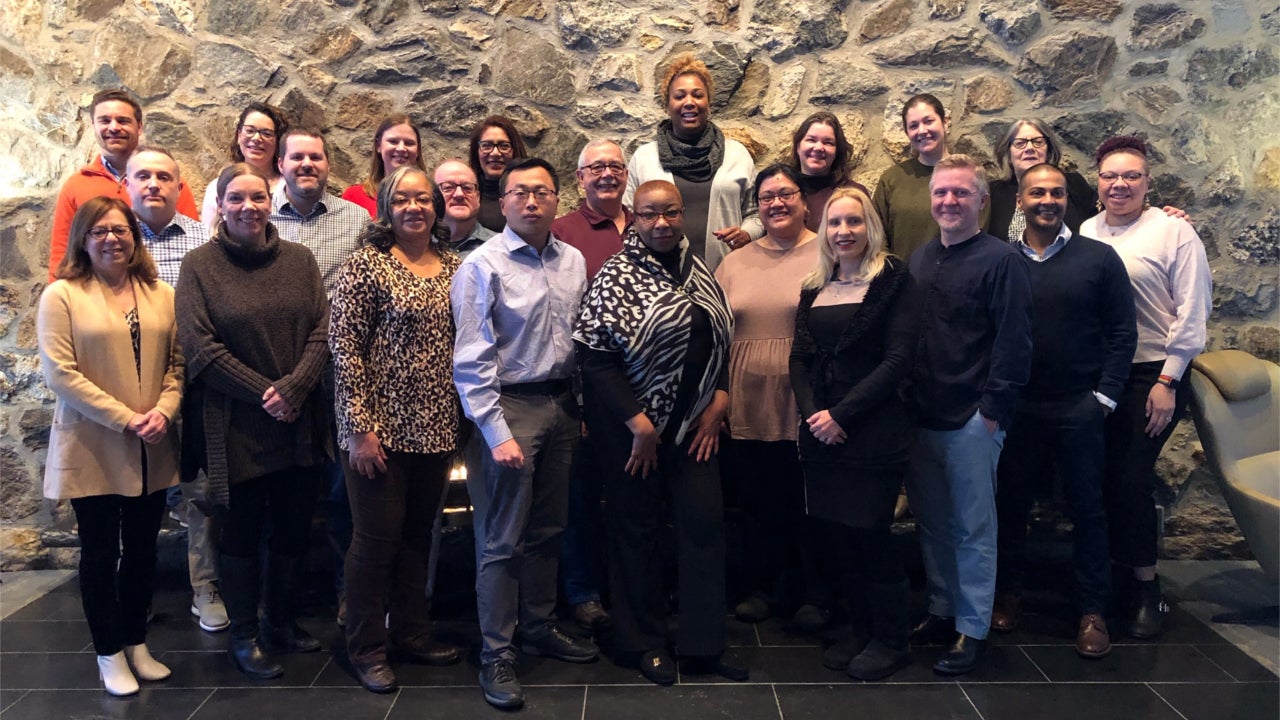The COVID-19 crisis is devastating working people and small business owners across the US. Low-income workers, people of color, and immigrant and marginalized communities bear a disproportionate burden in lost jobs, lost business, lost income, and, most alarmingly, imperiled health and lost lives. At the Aspen Institute Economic Opportunities Program, and for our many colleagues and partners, this crisis brings new urgency to our work to improve access to quality jobs, opportunities to participate in business ownership, and the freedom to pursue economic mobility. Below we share our May newsletter with highlights of recent work. As always, we welcome your feedback, thoughts, and partnership in advancing inclusive opportunity and an economy in which we all can thrive. Click here to subscribe.
New Job Quality Tools Library
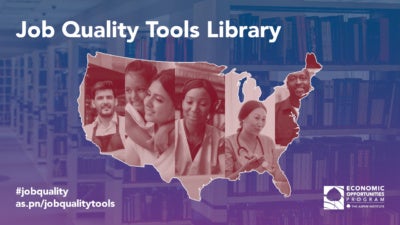
The global pandemic has created unprecedented challenges for workers, businesses, and the organizations that support them. As we come together to build a more inclusive economy, quality jobs are more critical than ever. This month we launched the Job Quality Tools Library, a platform to help leaders strengthen job quality in their organizations, in the businesses they partner with, and across labor markets. The library offers tools, resources, and guidance to help a variety of organizations engage in practical action to improve jobs. You will find tools to support workers and businesses during and after this crisis, including a special section of resources focused on urgent responses to COVID-19. Click here to read more.
Book Talk: Race, Economy, and COVID-19 with Eduardo Porter

Our long-standing divides by class, race, and ethnicity are widening as the effects of COVID-19 have a disproportionate impact on workers in low-wage jobs and communities of color. In a conversation with New York Times economics reporter Eduardo Porter—author of the new book, American Poison: How Racial Hostility Destroyed Our Promise—we discuss how we arrived here and the lessons history holds for finding a better way forward. This conversation features opening remarks from Aspen Institute President and CEO Dan Porterfield and is moderated by EOP Executive Director Maureen Conway. Click here to watch.
Op-Ed: Poorly Paid Workers Deserve Better than “Normal”

Writing in Quartz, EOP Executive Director Maureen Conway explains why we should be wary of getting back to “normal” after the crisis has passed: “American politicians, business leaders, and pundits are proposing strategies for restarting the economy and getting our lives back to ‘normal.’ But before we rush to reestablish things as they were, we should ask ourselves whether that’s really where we want to go. The working conditions we have accepted as ‘normal’ should not be our norm for rebuilding… The millions of people who do these essential jobs have been excluded from the abundance of our economy and marginalized by our society. We should not continue to accept this as normal.” Click here to read more.
Webinar: Increasing Equity in a Post-Pandemic Economy
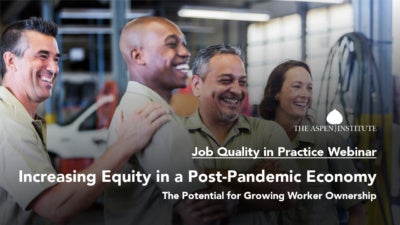
While the pandemic has brought enormous pain, can it also catalyze changes that expand equity and opportunity? Companies that share their success with employees—through employee stock ownership plans, worker cooperatives, and profit sharing—show strong resilience through economic downturns and often use management approaches that lead to higher-quality jobs. How can these strategies help shape the economic rebuilding that is to come? We hosted the sixth webinar in our Job Quality in Practice series, featuring Joseph Blasi (J. Robert Beyster Distinguished Professor, School of Management and Labor Relations, Rutgers University), Aspen Job Quality Fellow Tomás Durán (President, Concerned Capital), Aspen Job Quality Fellow Alison Lingane (Co-founder, Project Equity), and moderator Joyce Klein (Director, Business Ownership Initiative, The Aspen Institute Economic Opportunities Program). Click here to watch.
Webinar: Worker Organizations Respond to the COVID-19 Crisis
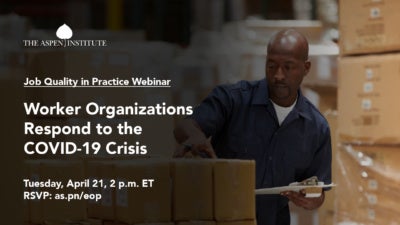
In earlier eras, worker organizations played critical roles in improving workplace safety and other dimensions of job quality—are we in a similar moment? We hosted the fifth webinar in our Job Quality in Practice series, featuring Aspen Job Quality Fellow Amanda Ream (Strategic Campaign Director, United Domestic Workers of America/AFSCME), Michelle Miller (Co-Founder and Co-Director, Coworker.org), Aspen Job Quality Fellow Tanya Wallace-Gobern (Executive Director, National Black Worker Center Project), and moderator Maureen Conway (Vice President, The Aspen Institute; Executive Director, Economic Opportunities Program). Click here to watch.
Blog: Giving a Voice – and Support – to American Workers
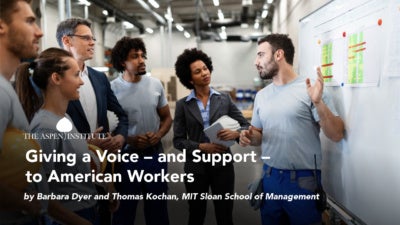
As we confront the effects of the global pandemic, long-term solutions must respond to the needs of the workers who make the country function. We profiled five Job Quality Fellows who are working to enhance worker voice and improve job quality: Linda Nguyen (Chief of Staff, UCFW Local 770; former Deputy Director, Jobs to Move America), Amanda Ream (Strategic Campaigns Director, UDW/AFSCME), Tanya Wallace-Gobern (Executive Director, National Black Worker Center Project), Milinda Ysasi (Executive Director, The SOURCE), and Justine Zinkin (CEO, Neighborhood Trust Financial Partners). This series features an opening blog post by MIT Sloan’s Barbara Dyer and Tom Kochan on why innovative approaches are needed to give workers a voice in their workplaces. Click here to read more.
In the News: Maureen Conway Talks COVID-19, Benefits, and ‘Essential’ Work on Marketplace
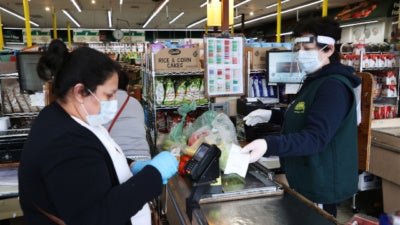
Despite being considered ‘essential’ during the COVID-19 crisis, many frontline workers—such as those in grocery stores, transportation, delivery, and food service—lack key benefits like health insurance, hazard pay, and sick leave. EOP Executive Director Maureen Conway shared her insights on Marketplace: “We are now newly recognizing grocery store workers and delivery drivers as valued workers… How do we really, truly value that work going forward?” Click here to read more.
Building a Digitally Resilient Workforce: Creating On-Ramps to Opportunity
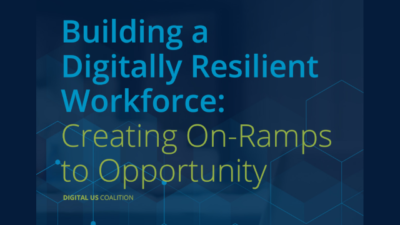
Despite the focus on big disruptions like automation and AI, most jobs in the future will simply change, not disappear. We must invest in upskilling workers and preparing them for the opportunities that lie ahead. As a member of the Digital US coalition, UpSkill America is proud to join its new call-to-action to make digital resilience a national priority. The inaugural report, Building a Digitally Resilient Workforce: Creating On-Ramps to Opportunity, “highlights the urgency—and imperative—of this work, and identifies opportunities to fill some of the most pressing gaps in access to technology and training and supports for digital upskilling.” Click here to read more.
Workforce Leadership Academies Meet Online
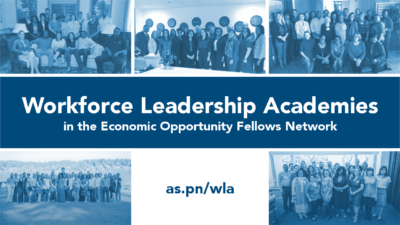
Fellows in Detroit and Dallas continue to meet virtually, with Academy partner Corporation for a Skilled Workforce, sharing and learning from one another about examples of collaboration and partnership to address workforce systems challenges, particularly in light of the health and economic circumstances created by COVID-19. Fellows in Hudson County convened virtually to learn about the CARES Act from Rob Garcia of the National Skills Coalition. Stay tuned for updates on how Fellows are leveraging their Academy experience to support COVID-19 response and recovery in the workforce system.
Upcoming at EOP
Business Ownership Initiative Director Joyce Klein will take part in a discussion on CDFI capitalization, hosted as part of the Federal Reserve’s CDFI Symposium Webinar Series. Registration is available here. Klein will also be presenting at a session on “New Lending: Underwriting and Credit Risk Management in Uncertain Times” at the Opportunity Finance Network’s Small Business Finance Forum on June 16.
EOP will soon be announcing its summer lineup of virtual events and webinars. Join our mailing list and follow us on social media to be notified as soon as new opportunities are available.
Join the conversation
Follow us on social media to join the conversation.
Tweet What’s new at EOP? Learn how the @AspenInstitute Economic Opportunities Program is helping people connect to and thrive in a changing economy.
About EOP
The Economic Opportunities Program (EOP) advances strategies, policies, and ideas to help low- and moderate-income people thrive in a changing economy. We recognize that race, gender, and place intersect with and intensify the challenge of economic inequality and we address these dynamics by advancing an inclusive vision of economic justice. For over 25 years, EOP has focused on expanding individuals’ opportunities to connect to quality work, start businesses, and build economic stability that provides the freedom to pursue opportunity. For more information, visit as.pn/eop.
EOP has several initiatives, including the Business Ownership Initiative, Workforce Strategies Initiative, UpSkill America, and Good Companies/Good Jobs. In addition, across these approaches EOP hosts the Economic Opportunity Fellows Network and the Opportunity in America event series.
The Aspen Institute is a global nonprofit organization committed to realizing a free, just, and equitable society. Founded in 1949, the Institute drives change through dialogue, leadership, and action to help solve the most important challenges facing the United States and the world. Headquartered in Washington, DC, the Institute has a campus in Aspen, Colorado, and an international network of partners. For more information, visit aspeninstitute.org.
Thank you to our many partners and funders for supporting our efforts.
Keep in touch
Click here to join our mailing list or sign up below. For updates every day, follow us on social media.
